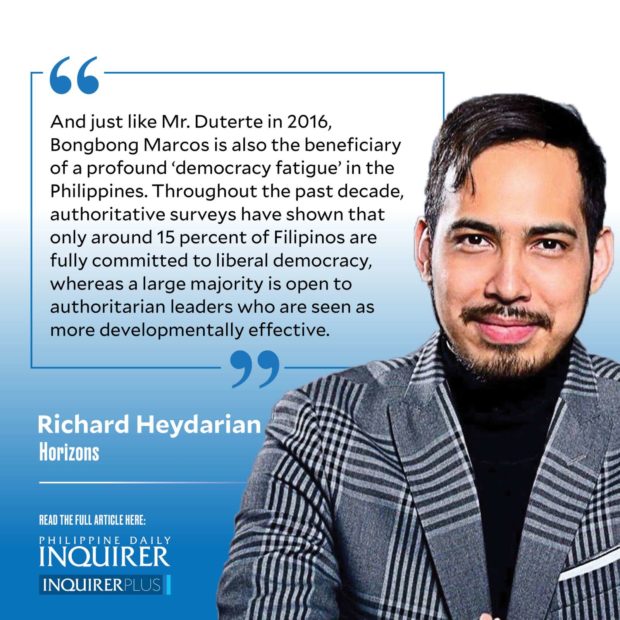Over the past week, the world bore witness to the violent outbursts of a fading autarch. Refusing to read the writing on the wall, President Duterte took on a top contender for his throne by accusing the latter of, among other things, pressuring his daughter to slide down to the vice presidential race, supporting communists, and being “a very weak leader” who keeps cashing in on his late father’s legacy.
Like Gabriel García Márquez’s caudillo in the “The Autumn of the Patriarch” (1975), Mr. Duterte is trying to defy the physics of democratic politics, since for the past half a decade “he alone was the government, and no one circumvented his will whether by word or deed.” Like the Latin American strongmen of the past, Mr. Duterte is simply too used to be “alone in his [personal] glory.”
The populist in Malacañang is now rallying behind his lifetime aide to have him inherit the throne next year. But the likely outcome of Mr. Duterte’s refusal to abandon the field to the Marcoses will only strengthen the hands of the opposition.
Barring another major curveball, next year’s race is increasingly looking like a rematch between former senator Ferdinand “Bongbong” Marcos Jr. and Vice President Leni Robredo, except this time for the highest office of the land.
As I have argued in two previous columns, “Why the Marcos brand remains popular” (10/26/2021) and “Macoyismo: The myth of a ‘golden age’” (11/9/2021), the resurgence of the Marcoses is a reflection of perennial institutional failures as well as the dearth of critical thinking in our public discourse.
And just like Mr. Duterte in 2016, Marcos Jr. is also the beneficiary of a profound “democracy fatigue” in the Philippines. Throughout the past decade, authoritative surveys have shown that only around 15 percent of Filipinos are fully committed to liberal democracy, whereas a large majority is open to authoritarian leaders who are seen as more developmentally effective.
Both Mr. Duterte and Marcos Jr. have effectively tapped into what can be described as “Singapore envy” among countless voters, who would rather have economic development under an authoritarian regime than institutional decay under a liberal oligarchy. This largely explains why Marcos Jr. is now the top preferred candidate of middle-class Filipinos as well as across the most industrialized regions of the Philippines.
But, as we saw back in 2016, Marcos Jr. is far from invincible. Ironically, Mr. Duterte could be instrumental to opposition victory, especially if the incumbent continues to take on the Marcoses with the same ferocity.
Mr. Duterte has gone so far as accusing a presidential candidate of allegedly being a cocaine addict. Although he refused to name names, practically everyone understood the implicit target of his midnight innuendos. Apparently, Mr. Duterte also failed to see the biting irony of such allegations after having waged a so-called “war on drugs” over the past five years.
Everyone is now wondering what Mr. Duterte’s strategic predisposition is vis-à-vis the disqualification petitions against Marcos Jr. Will he try to lean on his appointees, or will he instead, similar to his daughter, try to avoid a risky showdown with a powerful rival? Or, alternatively, will he ensure that the disqualification cases linger long enough until the current frontrunner loses steam?
So far, what’s clear is that Mr. Duterte is stepping up nationwide support for his loyal aide, Sen. Christopher “Bong” Go, who, together with Sen. Emmanuel “Manny” Pacquiao, is in a position to establish a robust electoral “wall” in Mindanao, thus denying the Marcoses a major surge in the southern provinces.
The biggest beneficiary of the latest development is arguably Leni Robredo, who is fast emerging as the alternative candidate to the Marcoses. Thanks to a rebranding coup anchored on post-liberal progressive politics and grassroots mobilization, Robredo has swiftly transformed from a laggard in nationwide surveys to cementing her position as the second most preferred candidate to succeed Mr. Duterte next year.
But Robredo will likely need to push her surveys numbers to around 25-30 percent in order to trigger a “rallying effect” among alternative candidates, as grassroots support and big donors gravitate toward the top candidates.
Key to her success would be a forward-looking narrative that not only emphasizes post-pandemic economic recovery, but also provides an inspiring alternative to the deficiencies of both liberal oligarchic politics as well as strongman populism. This is what a “pink revolution” should ultimately look like.
rheydarian@inquirer.com.ph
